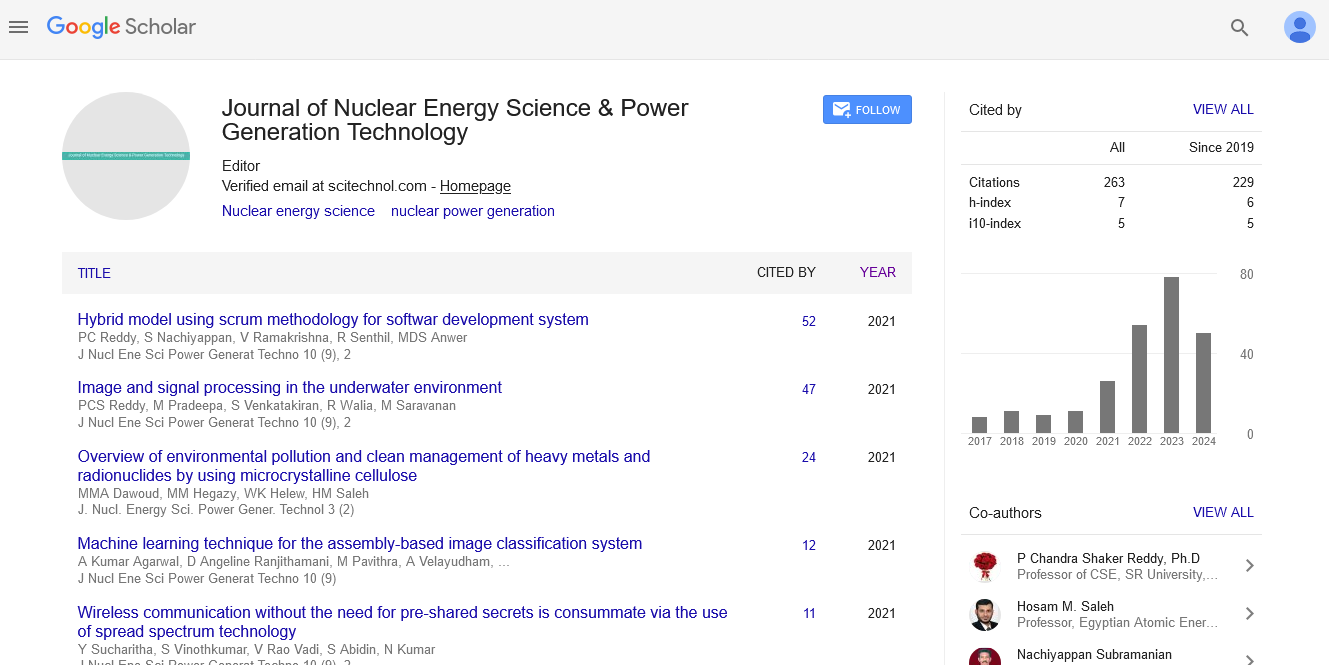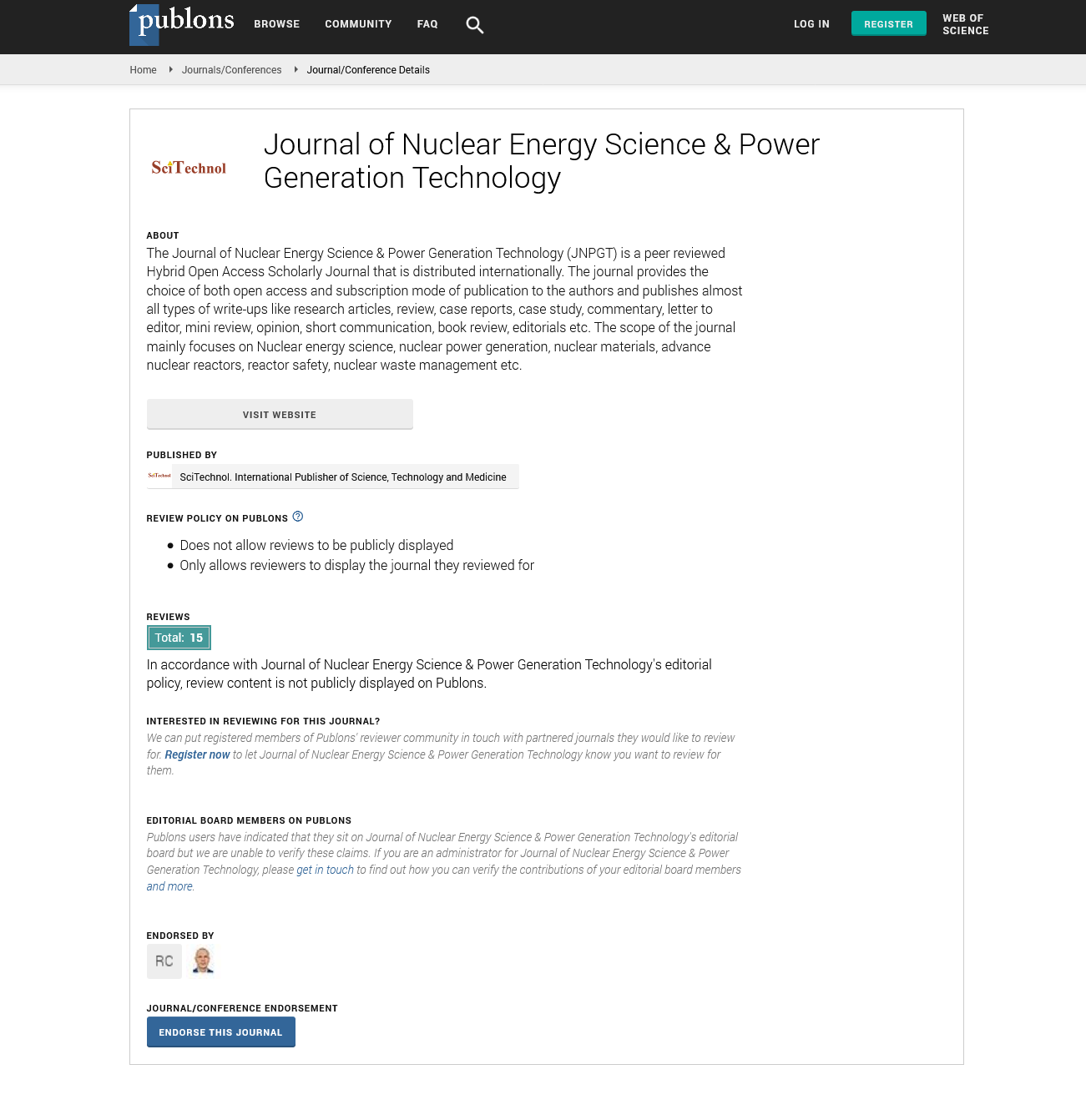Short Communication, J Nucl Ene Sci Power Generat Technol Vol: 13 Issue: 3
Hybrid Energy Systems: Integrating Renewable and Conventional Power for a Sustainable Future
Emani Jandu*
1Department of Electrical Engineering, Beni-Suef University, Beni-Suef, Egypt
*Corresponding Author: Emani Jandu,
Department of Electrical Engineering,
Beni-Suef University, Beni-Suef, Egypt
E-mail: emani_jandu123@gmail.com
Received date: 26 April, 2024, Manuscript No. JNPGT-24-140245;
Editor assigned date: 29 April, 2024, PreQC No. JNPGT-24-140245 (PQ);
Reviewed date: 14 May, 2024, QC No. JNPGT-24-140245;
Revised date: 21 May, 2024, Manuscript No. JNPGT-24-140245 (R);
Published date: 29 May, 2024, DOI: 10.4172/2325-9809.1000402.
Citation: Jandu E (2024) Hybrid Energy Systems: Integrating Renewable and Conventional Power for a Sustainable Future. J Nucl Ene Sci Power Generat
Technol 13:3.
Description
Hybrid energy systems represent a significant advancement in the search of sustainable and reliable energy solutions. By combining multiple energy sources typically renewable sources such as solar and wind with conventional sources like diesel or natural gas, hybrid systems aim to optimize energy generation, enhance grid stability, and reduce greenhouse gas emissions. This explores the principles, benefits, challenges, and future prospects of hybrid energy systems. Hybrid energy systems integrate various energy sources to leverage their complementary strengths and mitigate their individual weaknesses. Solar Photovoltaic (PV) panels, wind turbines, hydropower, and biomass are commonly used renewable sources [1-4].
These technologies are environmentally friendly and have low operational costs but are often intermittent and variable. Diesel generators, natural gas turbines, and coal plants provide reliable and controllable power, especially when renewable sources are unavailable. However, they come with higher emissions and operational costs. Batteries, pumped hydro storage, and other energy storage technologies store excess energy generated during periods of high renewable output and release it when demand exceeds supply [5]. This helps to balance the variability of renewables. Advanced control systems and software manage the integration and operation of the various components, optimizing energy use, maintaining grid stability, and ensuring efficient operation.
Benefits of hybrid energy systems
By combining renewable and conventional sources, hybrid systems can provide a continuous and stable power supply, reducing the risk of outages and improving grid stability. Hybrid systems can optimize the use of renewable energy, reducing the need for conventional power generation and lowering overall fuel consumption and operational costs. By maximizing the use of renewables and minimizing reliance on fossil fuels, hybrid systems can significantly reduce greenhouse gas emissions and other pollutants. Although the initial capital investment for hybrid systems can be high, the long-term operational savings from reduced fuel use and maintenance costs can make them economically attractive [6-8].
Hybrid systems can be designed to meet various scales of demand, from small remote installations to large grid-connected power plants. They can also be tailored to specific local conditions and resource availability. The capital investment required for installing renewable energy technologies, energy storage, and advanced control systems can be significant. Access to financing and incentives is essential for widespread adoption. Integrating multiple energy sources and ensuring their smooth operation requires sophisticated control systems and expertise in system design and management [9]. This can be a barrier, particularly in regions with limited technical capacity. Inconsistent or unfavorable regulatory frameworks can hinder the development and deployment of hybrid systems. Clear policies and supportive regulations are needed to encourage investment and innovation. Ensuring that hybrid systems can seamlessly integrate with existing power grids, especially in regions with weak or unstable grids, is a technical challenge that requires careful planning and coordination.
Applications
Hybrid systems are ideal for remote and island communities that lack access to reliable grid power. By combining renewable sources with diesel generators and storage, these systems can provide stable and sustainable energy, reducing dependence on expensive and polluting diesel fuel. Industries with high energy demands can benefit from hybrid systems by reducing operational costs and improving energy security [10]. For example, mining operations in remote locations often use hybrid systems to ensure a continuous power supply and lower fuel costs. In urban areas, hybrid systems can enhance grid stability and reduce peak demand by integrating distributed renewable energy sources with storage and demand response technologies.
Conclusion
The future of hybrid energy systems is capable, driven by technological advancements, decreasing costs of renewable energy and storage technologies, and the urgent need to address climate change. Innovations in battery technology, including longer life spans, faster charging times, and reduced costs, will enhance the effectiveness of hybrid systems. The development of smart grid technologies will enable more efficient integration and management of hybrid systems, improving their reliability and performance. Governments around the world are increasingly recognizing the benefits of hybrid systems and are implementing policies and incentives to support their deployment. Ongoing research into new materials, system designs, and control algorithms will continue to improve the efficiency, reliability, and cost-effectiveness of hybrid energy systems. Hybrid energy systems represent a versatile and powerful solution for meeting the world's growing energy needs sustainably. By combining the strengths of renewable and conventional energy sources, these systems can provide reliable, efficient, and environmentally friendly power. Overcoming the challenges of cost, complexity, and regulation will be vital for their widespread adoption, but the potential benefits make hybrid energy systems a key component of the future energy land.
References
- Casamirra M, Castiglia F, Giardina M, Lombardo C, Celata GP et al. (2005) Rewetting of a hot vertical surface by liquid sprays. Exp Therm Fluid Sci 29:885-891.
- Cheng SC, Lau PWK, Poon KT (1985) Measurements of true quench temperature of subcooled water under forced convective conditions. Int J Heat Mass Transf 28:235-243.
- Roth GA, Aydogan F (2014) Theory and implementation of nuclear safety system codes-Part II: System code closure relations, validation and limitations. Prog Nucl Energy 76:55-72.
- Karwa N, Gambaryan-Roisman T, Stephan P, Tropea C (2011) Experimental investigation of circular free surface jet impingement quenching: Transient hydrodynamics and heat transfer. Exp Therm Fluid Sci 35:1435-1443.
- Bogdanic L, Auracher H, Ziegler F (2009) Two phase structure above hot surfaces in jet impingement boiling. Heat Mass Transf 45:1019-1028.
- Islam MA, Monde M, Woodfield PL, Mitsutake Y (2008) Jet impingement quenching phenomena for hot surfaces well above the limiting temperature for solid liquid contact. Int J Heat Mass Transf 51:1226-1237.
- Carbajo JJ (1985) A study on the rewetting temperature. Nucl Eng Des 84:21-52.
- Fang X, Chen Y, Zhang H, Chen W, Dong A et al. (2016) Heat transfer and critical heat flux of nano fluid boiling : A comprehensive review. Renew Sust Energ Rev 62:924-940.
- Filipovic J, Incropera FP, Viskanta R (1995) Rewetting temperatures and velocity in a quenching experiment. Exp Heat Transf 8:257-270.
- Mozumder AK, Monde M, Woodfield PL, Islam MA (2006) Maximum heat flux in relation to quenching of a high temperature surface with liquid jet impingement. Int J Heat Mass Transf 49:2877-2888.
 Spanish
Spanish  Chinese
Chinese  Russian
Russian  German
German  French
French  Japanese
Japanese  Portuguese
Portuguese  Hindi
Hindi 

